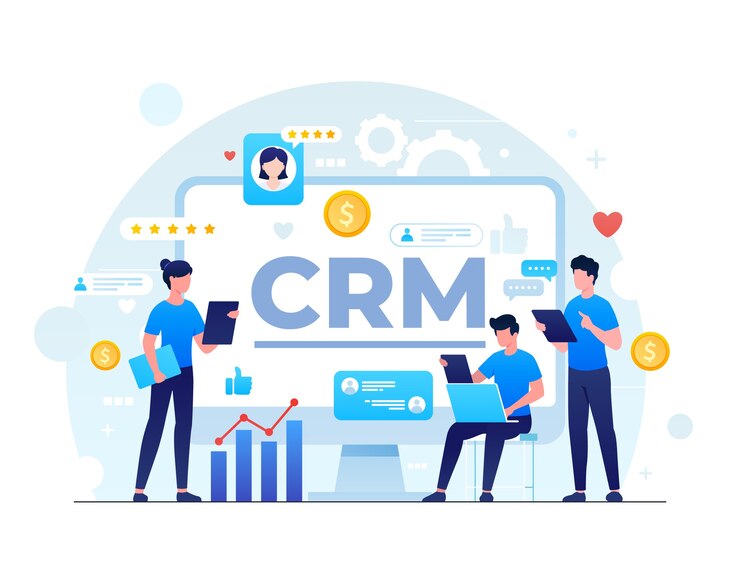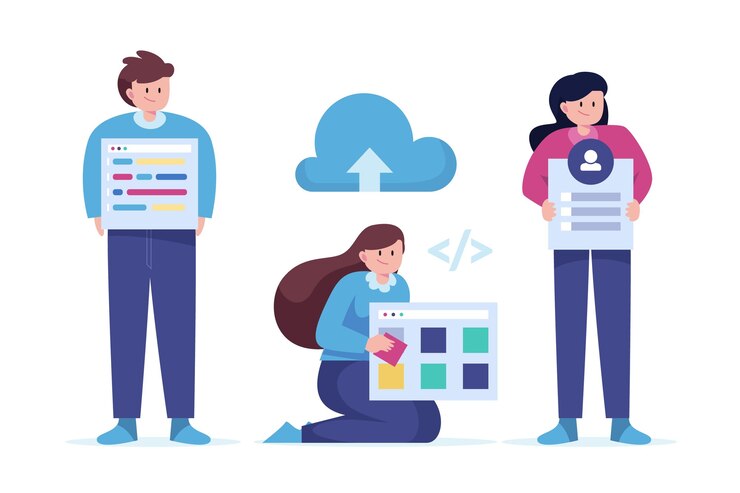Hiring an experienced Salesforce developer is essential for project completion and success in any business.
Picking the right developers means using the platform’s various personalization and integrations to build a solution that banks on Salesforce’s reputation and makes the most of top tools like Salesforce Einstein or Tableau AI for smarter decision-making.
The business world has never been as competitive as it is today, making it essential for businesses to benefit from what Salesforce developers offer.
Follow these steps to make informed decisions and build a strong development team to drive your Salesforce initiatives forward.
Key Roles in Salesforce Development
There are four essential Salesforce roles that every business needs to know about, each contributing toward a Salesforce implementation.
This section explores the four key roles in Salesforce development, setting the foundation for the rest of this article.
The key roles in Salesforce development include the following:
Salesforce Developer: Key Responsibilities
A Salesforce developer’s key roles include:
- Planning, designing, developing, and maintaining Salesforce programs, applications, integrations, and the various features in Salesforce products.
- Writing code for Visualforce, Apex, and Lightning Web Components that help improve on Salesforce’s already capable feature set.
- Integrating with various business systems, e.g., marketing automation tools, ERP systems, or third-party applications, a task that may require integration expert.
- Guaranteeing everything from the system planning to implementation and post-deployment support is the best in class.
What skills are required from Salesforce developers? Here’s a list:
- Salesforce developers must have strong programming skills in Visualforece, Apex, and Lightning Web components.
- Developers must comprehensively understand the Salesforce architecture, data models, and integration technology (middleware, APIs).
- Developers must have problem-solving and analytical skills as well as excellent communication and collaboration skills.
Salesforce Admin: What You Need to Know
A Salesforce administrator is tasked with various essential tools to get the implementation off the ground.
Administrators configure the Salesforce platform to meet business needs by customizing objects, fields, page layouts, workflows, etc.
They manage user access to the Salesforce platform, data quality, and security by participating in data import and export and creating reports and dashboards.
Salesforce administrators also train the end-user on using Salesforce in person or via comprehensive training material they help create.
Lastly, Salesforce administrators will perform all essential maintenance on the system, including resolving system issues and upgrading Salesforce instances.
Salesforce administrators must have these skills if they want the best results:
- Concrete understanding of Salesforce functionality and configurations.
- Data management and analysis combined with excellent communication skills.
- The ability to solve problems and troubleshoot anything that affects Salesforce.
- Adapt and upgrade Salesforce when new features or versions are added.
Salesforce Consultant: When to Consider Hiring One
Getting consulting services from trusted salesforce partner is the best decision a business can make before implementing Salesforce because it lets the experts handle a complex technical process.
Companies should consider hiring a Salesforce consultant when complex or large-scale projects are in the pipeline, there is a lack of internal expertise, or they have various Salesforce-specific or project management needs.
Businesses that are considering hiring one should know the benefits of hiring a Salesforce consultant include:
- Significantly more experience and in-depth knowledge of Salesforce implementations, best practices, and what to avoid.
- An unbiased perspective because Salesforce consultants are third parties hired by the business to implement Salesforce products and have no personal interest in the company.
- Salesforce consultants are experienced professionals with years of experience that help them accelerate project timelines and reduce implementation costs.
- Their experience reduces potential risks and guarantees a successful Salesforce project delivery.
Salesforce consultants are often the main point of contact for companies looking to benefit from Salesforce’s many products and services.
Salesforce Architect: Understanding the Role
Lastly, we have salesforce architects tasked with managing the entire process and guaranteeing everything goes according to plan.
Their role includes:
- Salesforce architects help design the overall Salesforce architecture to ensure it meets business requirements while aligning with best practices.
- Salesforce architects provide technical guidance and leadership to development teams, telling them what to do and how to do it.
- Architects define the integration strategy for connecting Salesforce with other systems to ensure the new and existing systems work seamlessly.
- Salesforce architects help ensure the performance and scalability of Salesforce solutions.
- Salesforce architects design and implement security measures to protect sensitive data.
Similar to the three other roles we’ve mentioned, being a Salesforce architect has its prerequisites.
These include a comprehensive understanding of Salesforce architecture and platform capabilities and strong technical and analytical skills.
Their expertise should contain enterprise architecture and design patterns experience coupled with expert communication and leadership skills.
Lastly, Salesforce architects must be able to think strategically and long-term to guarantee their Salesforce implementations are right on the money.
Key skillset for Salesforce Architect Role
by insalesforce
Why Hiring the Right Salesforce Developer Matters
Hiring the right Salesforce developer spells the difference between achieving the desired ROI and making a costly but ineffective investment.
Picking the right Salesforce developers can avoid expensive eros, inefficient, and incorrect processes and guarantees the best possible Salesforce implementation.
These five areas benefit from hiring experienced Salesforce developers:
Salesforce Customization and Integrations
Experience Salesforce developers build custom Salesforce solutions that account for unique business needs with custom applications, system integrations, and process automation.
Covering the essentials of a Salesforce implementation helps the business improve its operational efficiency, i.e., team productivity and business performance.
Ensuring Data Accuracy and Integrity
Salesforce developers possess a strong understanding of essential data management processes used to guarantee the highest level of data accuracy and integrity.
Having accurate, updated business data in real-time helps businesses make better decisions because of a well-implemented CRM.
Ensuring data accuracy and integrity is essential for companies, and an experienced Salesforce developer helps make that a reality.
Delivering A High-Quality User Experience
The user experience can decide how well or poorly a Salesforce implementation is essential to a Salesforce developer’s job.
Hire experienced developer understand the needs of marketing, sales, and service teams and create visually appealing and user-friendly interfaces.
A high-quality experience involves streamlining essential processes that help users get the job done better while also improving adoption rates to improve the effectiveness of the Salesforce implementation.
A great Salesforce implementation hinges on the end users’ experience because it was implemented to improve workflows, not slow them down.
Preparing for Scalability and Future-Proofing
As the business continues to grow, it needs a platform that grows with it to accommodate the additional workload and expectations.
Experienced Salesforce developers understand how businesses grow, and their experience in scalability and future-proofing helps ensure their implementation.
Guaranteeing Security and Compliance
Salesforce products encompass large datasets and can handle large volumes of users accessing the platform, which requires impenetrable security.
The last thing a business needs is a data breach that compromises data integrity and could damage its reputation irreparably.
Skilled Salesforce developers know how to implement robust, impenetrable security protocols that protect essential data in compliance with the latest industry standards and regulations.
Advice on hiring a Salesforce Developer? (Technical Interview)
byu/filthymangos insalesforce
Benefits of Hiring a Salesforce Developer
The main benefits of hiring a Salesforce developer include the following:
- Increased operational efficiency courtesy of streamlined processes, automated tasks, and improved data management, resulting in significant time and cost savings.
- Improved Productivity thanks to a well-designed Salesforce implementation that empowers your teams to work more efficiently and effectively.
- Better data management and personalized interactions can improve customer satisfaction and loyalty.
- Data-driven decision-making with accurate and timely data helps make better business decisions and drive strategic initiatives.
- A well-implemented Salesforce system can give your business a competitive edge by improving sales, marketing, and customer service operations.
Key Steps in Hiring a Salesforce Developer
Hiring a Salesforce developer is a meticulous recruitment process that involves passing them this checklist of essential skills and prerequisites.
These key steps in hiring a Salesforce developer are:
Defining Your Business Requirements
Have clearly outlined project goals and objectives that show what you want to achieve with Salesforce, e.g., what specific problems is the business trying to solve?
Have clarity on the essential features and functions the business needs, such as custom applications, cross-system integration, and potential personalization.
Additionally, the budget and timeline for the Salesforce implementation must be determined, and a developer must be found to meet the specific needs the business has come up with.
Identifying Key Skills and Expertise
Knowing which skills and expertise you need from the developer is the second most crucial step in hiring a Salesforce developer.
Technical skills
The technical experience includes:
- Apex: A proprietary programming language used to extend Salesforce functionality.
- Visualforce: A framework for creating custom user interfaces within Salesforce.
- Lightning Web Components: A modern framework for building reusable UI components.
- Salesforce APIs: Experience with REST, SOAP, and other APIs for integrating Salesforce with external systems.
- Data Migration: Understanding of data migration tools and techniques.
- Version Control Systems: Familiarity with Git or other version control systems for managing code changes.
Keep in mind strong technical skills of a developers matters to solve common technical errors.
Industry Experience
Industry experience involves whether they’ve worked in your industry, e.g., financial services or healthcare.
Having industry experience is a plus point because the Salesforce developer knows what works in that niche making them better suited for a Salesforce implementation.
You want an expert handling such a crucial aspect of the business and hiring a Salesforce developer with industry experience guarantees that.
The Importance of Salesforce Certifications
Salesforce certifications show that the developer has received a comprehensive, structured curriculum on various essential topics.
The main certifications to look for include:
- Salesforce Certified Platform Developer I
- Salesforce Certified Platform Developer II
- Salesforce Certified Platform App Builder
However, certifications only show that the person learned but it is their implementation of their learnings that makes them the right candidate for the job.
Evaluating Candidates: Key Factors to Consider
Finding experienced Salesforce developers requires careful consideration of various technical and non-technical factors along with portfolios and their past work.
These are the key factors to consider when evaluating candidates includes:
- A technical skills assessment via technical interviews or coding challenges to gague their technical skills and problem-solving abilities.
- Determining whether they’re a cultural fit by evaluating whether the candidate’s personality and work style align with your team culture.
- Assess the candidate’s communication and interpersonal skills, both verbally and in writing.
- Gauging their problem-solving and analytical skills by presenting the candidate with real-world scenarios to find out their ability to think critically and solve problems.
How to Review Portfolios and Past Work
Salesforce developer portfolios help companies determine whether they’re the right fit for the job.
Portfolios demonstrate what the development team has done, what industries they’ve worked with, and how they’ve solved problems
Here’s how to review portfolios and the developer’s past work:.
- Review the candidate’s portfolio carefully by looking for projects that demonstrate their skills and experience in Salesforce development.
- Ask specific questions about the projects in their portfolio, such as: what challenges did they face? How did they overcome them? What were the results of their work?
- Request references from previous employers or clients. This can provide valuable insights into the candidate’s work ethic and performance.
Screening Process: How to Select the Right Salesforce Developer
We’re finally at the business end of the article that addresses the more serious question, i.e., how to select the right Salesforce developer for your company.
Resume and Portfolio Screening
The relevant keywords to look for include: Visualforce, Apex, Lightning Web Components, APIs, and the certification’s we’ve mentioned above.
Prioritize the candidates with the right type and amount of experience for the job by looking at which industry they’ve worked in and what projects they’ve successfully delivered.
Go through their portfolio to evaluate whether they have the right quality and complexity in their delivered projects, looking out for sufficient skill demonstration and problem solving abilities.
Contract vs. Full-time: Which Option is Right for You?
There’s a common debate between hiring Salesforce developers on a contract or as full-time employees.
The only right answer is the one that satiates the company’s objectives properly and within budget.
The Pros and Cons of Contract and Full-time Salesforce Developers
Here are the pros and cons of a contract Salesforce developer and a full-time Salesforce developer:
Contact
| Pros | Cons |
|---|---|
| Flexibility: Scale your team up or down based on project needs. | Less stability: No guaranteed long-term employment. |
| Cost-effective for short-term projects: Pay only for the work needed. | Less commitment: May not be as invested in long-term company goals. |
| Access to specialized expertise: Hire experts for specific projects or skillsets. | Potential for higher costs: Hourly rates can be higher than full-time salaries. |
| Reduced overhead: No need to provide benefits or cover overhead costs. | Project-to-project variability: Can lead to inconsistent work and income. |
Full-Time
| Pros | Cons |
|---|---|
| Stability and long-term commitment: Builds a strong, dedicated team. | Higher overhead costs: Salaries, benefits, and other expenses. |
| Improved collaboration and knowledge sharing: Fosters a strong team culture. | Less flexibility for scaling: Difficult to quickly adjust to fluctuating workloads. |
| Increased employee loyalty and motivation: Offers opportunities for growth and development. | Potential for higher costs in the long run: Salaries and benefits can add up over time. |
How do you determine which option is right for you? These questions help answer that question:
- What is the project scope and duration?
- What sort of budget and budget constraints do you have?
- What are the company’s skillset requirements for the job?
- What sort of team culture and dynamics do you want to build around the Salesforce implementation?
Onboarding Your New Salesforce Developer
This is the tail-end of the article where you’ve finally gone through the hiring process and found Salesforce developers that can get the job done for you in the best possible way.
Now, it’s time to onboard your new Salesforce developer and here’s what you need to do to get that done:
Facilitating a Smooth Onboarding Process
Have a dedicated onboarding plan ready for them outlining the essential steps required during onboarding, i.e. project timelines, expected responsibilities, and resource availability.
Partner the new developer with an existing team member that can guide them through the process, answer their questions, and help them with your organization.
Have routine check-in meetings once a week or twice a month to follow up with implementation progress, address any challenges they have, and give them feedback.
Steps to Integrate Your Developer into the Team
Organize some sort of team meeting that helps the Salesforce developer gel with their new team and build strong working relationships.
Provide the Salesforce developer with clearly defined responsibilities and let them explicitly know what is expected of them and when they need to deliver.
Providing Access to Tools and Resources
- Provide necessary hardware and software to ensure your new developer has access to the necessary hardware, software, and development tools.
- Grant access to Salesforce with the necessary credentials and access levels.
- Share relevant internal documentation, code repositories, and other relevant resources.
Conclusion
Hiring the right Salesforce developer is crucial for the success of your project.
By clearly defining your requirements, assessing technical skills, and evaluating cultural fit, you can ensure that you select a candidate who not only meets your technical needs but also aligns with your team’s values and goals.
Take the time to conduct thorough interviews and review past projects to gauge experience and expertise.
With the right developer on board, you can leverage Salesforce’s powerful capabilities to drive your business forward and achieve your objectives efficiently.
FAQs
How Much Does It Cost to Hire a Salesforce Developer?
The cost to hire a Salesforce developer varies from $25-40 an hour up to $81-100 an hour depending on experience and expectations.
What Should You Look for in a Salesforce Developer?
- Strong technical skills
- The correct Salesforce certifications
- Experience working with various Salesforce products
- Experience working within your businesses niche
- Problem solving abilities and deadline management skills.
- Team collaboration and delegation
How Do You Find Experienced Salesforce Developers?
Experienced Salesforce developers can be hired from freelance platforms like Upwork and Freelancer.com or job boards like LinkedIn and Indeed.

Navaid Ahmed
Director Of Engineering at Folio3 Software | Head of Product Management
Navaid Ahmed is a Seasoned Salesforce CRM expert, who brings a wealth of experience in optimizing sales processes, enhancing customer relationships, and driving business growth. With a deep understanding of Salesforce's capabilities, Navaid specialize in crafting tailored solutions that empower organizations to streamline operations, boost productivity, and achieve their sales objectives.


